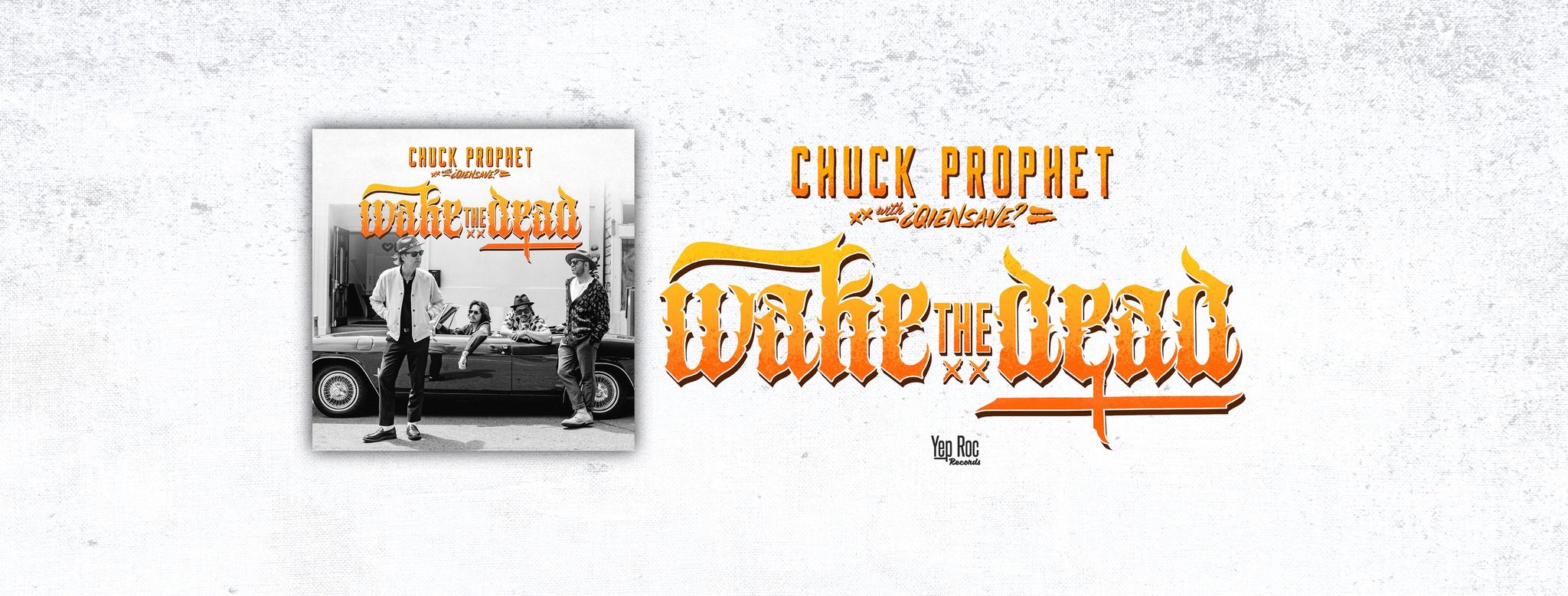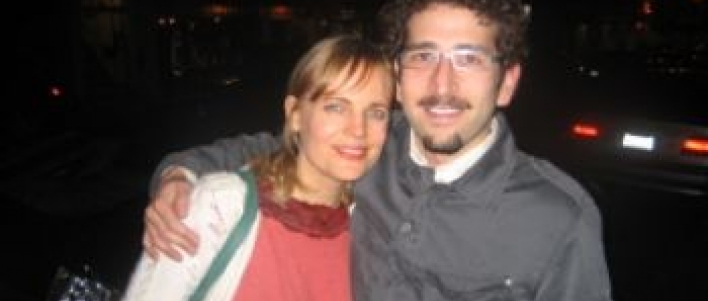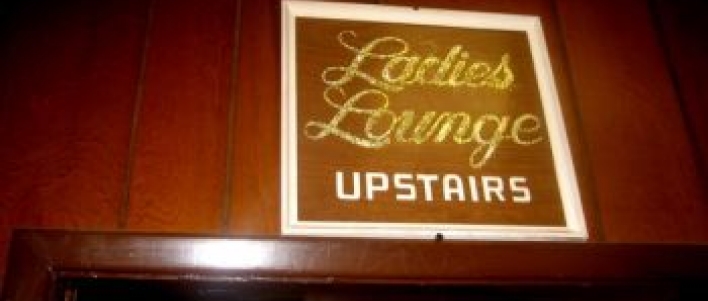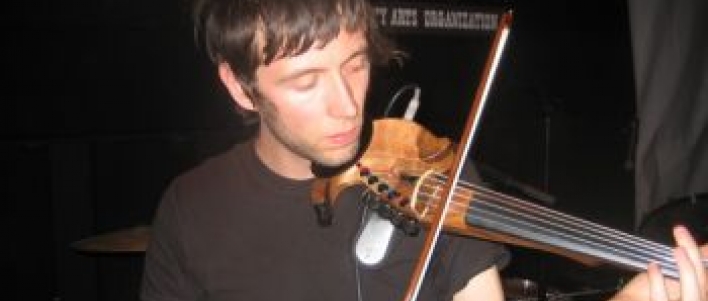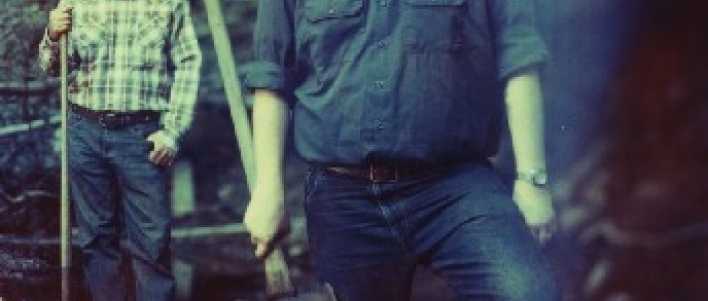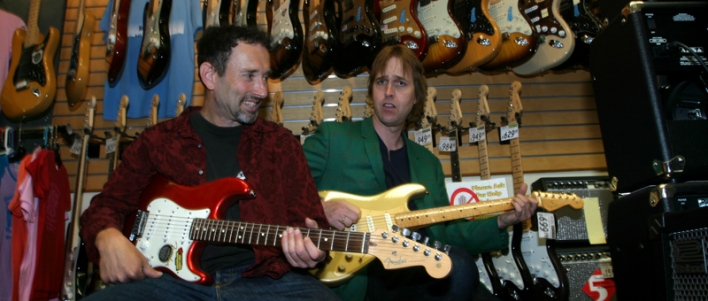Murder Ballad Miners: Bob Frank And John Murry
Many moons ago, while playing guitar for my guru of voodoo: Jim Dickinson, he pulled out a song called “Wild Bill Jones”... a killer tale of blood and lust. When I asked who wrote it, he said, “That’s Bob Frank. The greatest songwriter you never heard—long since disappeared from the face of the earth.” I filed that away and kept an eye out for Bob’s debut (and only) record originally released by Vanguard in 1972. One day at a used record store, I scored big when Bob’s face looked right back at me from the bin like a dope-running, Jesus loving, Davendra doppelganger. Eureka!
In 2002, Bob broke his silence and released Keep On Burning, his first album in 30 years. I got wind and ordered it straight from the source, Bob himself. Bob and I talked a bit and I sent him a check. I learned that Bob no longer lived in Memphis and was actually living just over the bridge in Oakland. He even came by one of my shows. God-damn! Bob Fucking Frank! I was struck by his good humor, youthful appearance and the fact that he rarely wore shoes. We chatted each other up and made big plans to play some shows together.
The shows never really came together.
Presently, I rent a shoebox-like office space above Closer Recording Studios, a kind of underground studio collective run by my old pal Tim Moony. Turns out that Bob Frank and his sidekick John Murry have been in the studio below me toiling away on another record of Murder Ballads. New Murder Ballads. Interesting. Bob Frank was getting less and less obscure. I poked my head down there one night when Bob, John and Tim were working and was floored by what I heard coming out the speakers. Bob and John had been rooting around in the muddy shadows of American history for long-forgotten true tales of murder, suicide, and death. The goal was to create a CD of songs that are a dark reminder of the skeletons in our nation’s closets. And the singing and playing are pretty good too.
Bob and John celebrate the release of World Without End with a rare live appearance backed by a group of musicians so big they could induce vomiting from Lambchop. The show will include a multi-media slide show replete with images and crime scene evidence. A gig not to be missed. They will be appearing live at the Freight and Salvage on October 26th. Opening the show will be the Stephanie Finch duo with yours truly on guitar… quite the honor. The following is a recent conversation I enjoyed with the two of them.
——————————————————————————
CP: Hey Fellas…. Bob, you made your first record for Vanguard back in 1972, your second record didn’t come out until 2002. Why so long between records?
Bob: Long story. I was busy raising a family. I didn’t see how I could make any money from music, so I got a regular job.
CP: You’re both Southern boys… from Tupelo Mississippi in the case of you John, and Bob, you’re from where?
Bob: Memphis, Tennessee.
John: The Sovereign State of Mississippi.
CP: How’d you guys meet?
Bob: A mutual friend in Memphis, Don McGregor, told John to look me up when he came out here. Don plays music, sings, in fact, he says he’s been singing some of my songs as long as I have.
John: I moved to Memphis after high school and was sorta adopted by Don McGregor. He taught me all the worthwhile guitar stuff I know. When Bob and I started playing together he’d pull out these songs I already knew how to play because I’d heard Don do ‘em so many times before. I didn’t know whose songs they were, I just thought they were good. Stuff off the Vanguard record like “Before The Trash Truck Comes” and “She Pawned Her Diamond”.
CP: How’d you come to take on this project? Not for the money I imagine.
Bob: Itwas John’s idea. Originally, we were going to do an album of old murder ballads, songs that already existed. Like “Omie Wise” and “The Banks of the Ohio”, but when we started recording them, we realized it wasn’t going to work. They’d already been done too many times. So John says, we will have to write all new songs, but make them sound old.
John: I started getting annoyed with the salvatory overtones of all the old murder ballads. You know, somebody’s right and somebody’s wrong. They go to hell or heaven. Lots of judgment, usually the entire last verse. Not all of ‘em but most, anyway. What disturbs me the most is knowing that people (all people) are capable of taking on both the role of the killer and the killed and sometimes, it seems, they do it for no damn reason at all. That’s reality, ya know. I wanted to make sense of some of the mess for myself. There’s an old Italian proverb that says, “At the end of the game both the pawn and the king go back into the same box”. Nothing I do in this life can stop it. In the end, life kills you if something else doesn’t do it first. So… for me some of this came out of a fairly morbid fear of death and some of it came out of wanting to set the record straight, let folks know how some of these stories really happened without telling them how to feel about it.
CP: Murder ballads are interesting because the people in the songs are real. A good murder ballad exposes the souls of the perps as well as the dead victims who aren’t here to speak for themselves. Do you ever feel funny giving a voice to the dead?
Bob: I feel funny doing anything, Chuck. But as for singing like I’m a dead man, no, that seems perfectly normal. Although, I do sort of wonder if these people were actually anything like we drew them. Like John Willis. Did he really have a sister? What was he like? I don’t know. So in that sense, yeah, you could say it’s sort of weird. But in another sense, you just use this story to present a certain mind. And you try to stay true to that sort of mind. And in these cases, in these songs, the minds are all pretty extreme. So you get a lot of emotion going on. In Dharma, they say there are 84,000 afflictive emotions. I think we covered ‘em all in this album.
John: At first I just wanted to get it right. You know, make the lines and music fit, get the story right and all that shit. It wasn’t until after we had laid down the basic tracks that I sat back and realized what we had done. It does hit me in a strange way sometimes, almost like I’ve stepped out of myself into something else entirely. Maybe these stories didn’t happen exactly like we interpreted them, but I can see them unfolding so clearly in my mind. It’s kinda haunting.
CP: Pretty gruesome stuff here. Jesse Washington’s character from the grave sings, “They cut off my balls and doused me with Kerosene…” Later in the song he sings, “I could smell my own flesh burning…. somebody wacked off my fingers…” Was there anything too graphic for you guys?
Bob: Well, we didn’t get into pornography here. We could have. But that would have been really funny, as in humorous. Like my favorite old blood and guts song about the “Castration of the Strawberry Roan.” There’s a graphic song for you. But no, there was nothing too gruesome to put on here. Some of these stories, we didn’t know the whole story when we wrote the song, so it could have been even more gruesome or macabre in some instances, but we did the best we could with the limited means at our disposal. Actually, the more graphic and gruesome it was, the better we liked it. But we tried to do it in an amoral manner. That was our intention when we set out. Whether or not we succeeded, now we aren’t so sure…
John: I wanted to tell these stories like they really happened, as best we could, anyway. Particularly Jesse Washington. The city of Waco, Texas still refuses to build a memorial acknowledging what the NAACP called the worst lynching in American history happened on the lawn of their courtyard, with their chief of police and mayor looking on. What the fuck is it with Waco and fire? They’ve repeatedly said they wanna just put it behind them. You can’t shove shit like that aside. It’s too much to ignore. They’re still doing it 90 years later. My wife won’t listen to that song. She says it’s too painful. I hope it is. I hope all of these songs are. Not because it’s fun to make people uncomfortable but because it’s necessary sometimes. Like Bob said we tried to do it in an amoral way. I always liked that Hannah Arendt quote about “the banality of evil” until we did this record. There’s nothing “banal” about it. They’re fucked up, these stories. I doubt anyone involved in these killings would’ve agreed with her statement. I can’t believe it anymore. It’s far too convenient.
CP: Do you have a favorite murderous song, like “Psycho” by Jack Kittel or something by say Black Sabbath?
Bob: Huh? My all time favorite recording of a murder ballad is Jim Dickinson’s version of Wild Bill Jones, on his 1972 Atlantic album, “Dixie Fried.” That sort of set the standard for modern murder ballads, just ask Nick Tosches.
John: I figured Bob would say that was his favorite. He wrote it. It’s a great song. As far as old ones go I like “Lily Schull” and that Leadbelly song “You Don’t Know My Mind” (the version Kenny Brown, RL Burnside’s old guitar player did is brilliant. Dale Hawkins produced it.) I can also get down with some “War Pigs”, Neil Young’s “Down By The River”, and The Talking Heads’ “Psycho Killer”. All the Tom Waits stuff is good too.
CP: Nick Cave did a record of murder ballads a few years back—with all due respect to Mr. Cave, I got the distinct feeling that Nick Cave didn’t give a shit about those people he was singing about. Did any of the folks in these songs get under your skin more than others?
Bob: Some of these people, you couldn’t help but form an opinion on them. We sort of liked Little Wylie Harpe better than Joe Smith. In fact, I guess I have an opinion about all of these folks in these stories. They’re like real people to me, so you try to understand them, figure out why they did what they did. So in that sense, they all got under my skin. Because the stories are different, the characters are different, so you feel a different relation with each of them. Like Kid Curry, you sort of like that guy. And Boss Weatherford. They just sort of took what came their way, whether it was an opportunity or a danger. And Jesse Washington. He was mentally retarded, they say. So you really feel for this guy. That song will break your heart.
John: Yeah, the gunshots and microphone spittle in Nick Cave’s version of “Stagger Lee” (he even fucked up the spelling) are ridiculous. I liked “Tender Prey” and some of the other stuff and think some of the lyrics in his version of “Crow Jane” are sorta brilliant. When I played it for Bob once he just sat there and said, “That guy’s just angry”. Bob’s right, I think. Australians have to work hard to be dark. The South was just built that way. I wanted to leave our songs open-ended and let the listener have their own opinion. Maybe it didn’t quite work out. You can’t help but have an opinion about these stories. We tried, though. Something about being human kinda makes that impossible. Do you think Nick Cave is from another planet, maybe?
CP: What about a favorite concept album? You know, like Quadrophenia? Do you guys have one?
Bob: I don’t have much of a concept about that.
JM: I love The Drive-By Truckers’ “Southern Rock Opera”. Also, Love’s “Forever Changes” and The Kinks’ “Muswell Hillbillies”. You know Aleksandr Scribian? He was a Russian composer who wrote these symphonies to bring about the end of the world. He thought it had gone on far too long and for the good of humanity wanted to end it all. He died before he finished. I like that, too.
CP: I have a Murder ballad collection here written by Olive Woolley, a Mormon woman in 1958. She describes the murder ballad as “an exciting side street of American History”. In this collection, there are verses dedicated to the massacre of the Indian and the white man. I got to thinking that maybe if it were to be updated, it might have to include the Jonestown Massacre. What do you guys reckon?
Bob: Oooooh, yes. You’d have to write that one. Jim Jones and his electric kool aid. That’s a terrible tragedy. But you’d also have to include the Middle East. Maybe the Twin Towers. Somebody walking into a library with a bomb in his satchel. The Oklahoma bombing, the guy up in Montana, the Davidian thing in Texas… there’s too many of ‘em. You could write murder ballads from now til doomsday. Might not be enough time left to write very many of em….
JM: Yeah, the Jonestown Massacre would have to be in there, but you’d have to include the part about how Jim Jones fought so hard to erect a suicide barrier on the Golden Gate Bridge for years before he murdered all those people. I’d wanna do the Heaven’s Gate thing, too. Maybe an album of religious mass suicides?
CP: Tell us about some of the musicians—for example. Brad Postlethwaite played the bowed saw. Who’s Brad and why a bowed saw?
Bob: John got these musicians together. He picked a perfect bunch. He wouldn’t rehearse the songs with them ahead of time, just had them come in the studio and play it off the cuff. He wanted them to come up with something weird and unusual, and when you hear this album, you will know that’s just what they did. They were all unique musicians, with ideas of their own, and that’s what gives the album such a unique taste. I could talk about all these folks, like Quinn Miller, the dead-on bass player, or Brian Hendrix, who played the banjo and fed us all some of his homemade barbecue, or Kate Howser, who sang such a pretty harmony on “Joaquin Murietta”, or David Manning, who played a 600 year old fiddle and came up with some killer lines…. and shared his whisky with me. Or Tim Mooney, when I watched him playing the drums, it was so pure and smooth, it approached the inexpressible. I think it actually arrived there. But the guy who played so many instruments on all these songs, and actually set the tone for the whole album, was Nate Cavaileri. You don’t ever want to make an album without him on it. Only problem is, you have to drive him home afterward… As to Brad Postlethwaite, John can answer this one. All I know is, he played that saw perfectly. Hit just the right notes, with just the right feel. Perfect.
John: Brad’s in a band in Memphis called Snowglobe. We’ve been friends since we were 18 years old. He played on the first thing I ever recorded at Easley (which sadly burned down a year and a half ago). He’s a brilliant songwriter and can play anything, especially things not meant to be played. He’s got a great solo record out called “Welcome to the Occupation”. Everyone should listen to it. I really can’t say enough about the folks who played on this record. I really gotta say that Nate Cavalieri made the thing what it is, though. He’s amazing. A real ringer, ya know? His piano, organ, tympani, glockenspiel, accordion, etc., work made the record what it is.
CP: This record was produced and engineered by Tim Mooney (Sleepers, American Music Club). How did you guys hook up?
Bob: John found him. Tim’s a genius. Talk about knowing what to leave out, this guy wrote the book on it.
John: I just always liked the American Music Club stuff and think Timmy sort of embodies the rock and roll ethos, like Dickinson says Bob Stinson did. What a nice guy, too. He let me smoke almost all his cigarettes every day we were in there. Bob can get a little proprietary about his sometimes, especially since I quit smoking. Tim believed in this record like we did, wrestled with ideas right along with us. And goddamn he can play the drums.
CP: How long before we can expect a sequel? There’s been a lot of bodies piling up in the last hundred years. Might I suggest Bebi Lee as subject matter? She was a UC Berkeley student who was killed by her boyfriend while out for a jog in 1984. Dude smashed her head in with a rock. Later after her body was cold, he came back for a midnight booty call. A farewell romp. Anyway, it was pretty big news around here. So yeah, what about volume two?
Bob: I’m up for anything. We will definitely be writing some more songs about something someday soon… might as well be another murder ballad… John has an idea, do a whole album about just one story. So every song would be sort of like a moment or two in the sequence of the tale. Which is probably just what an ordinary musical is…. so maybe that ain’t such a unique idea as it seems… But I can guarantee you, if John Murry does it, it will come out sounding unique, no matter what.
John: Jesus Christ that’s fucked up. Necrophilia and all. Maybe we oughta do a more modern thing, with stories more recent. It’d be harder, though. Not as
much distance from the subject. I wanna do the Bubba Rose story as a whole album. We found out a lot more about it after we wrote the song. It’s an incredibly Southern Shakesperian tragic-comedy. I wanna do it from when he was a little kid until he was sent to prison. Hell, I’ll do anything Bob wants to do.
Last thoughts from Chuck:
I’d like to apologize to anyone who found the previous conversation offensive in any way. Particularly any family members of the People’s Temple cult. It’s not easy to stare down shit this gruesome without the uncomfortable chuckle or sideways crack. The songs and the performances are really quite moving.
Sometimes we laugh to keep from crying. That’s what they say. Maybe it’s true.
PS: If you’re looking to find a copy of Bob Franks’ Vanguard record, when asked where to find this record, Bob encourages folks to pester Steve Buckingham, Vice President of Vanguard. By calling him up and encouraging him to re-release the record. (Steve Buckingham’s number in Nashville is (615) 297-2588.)
